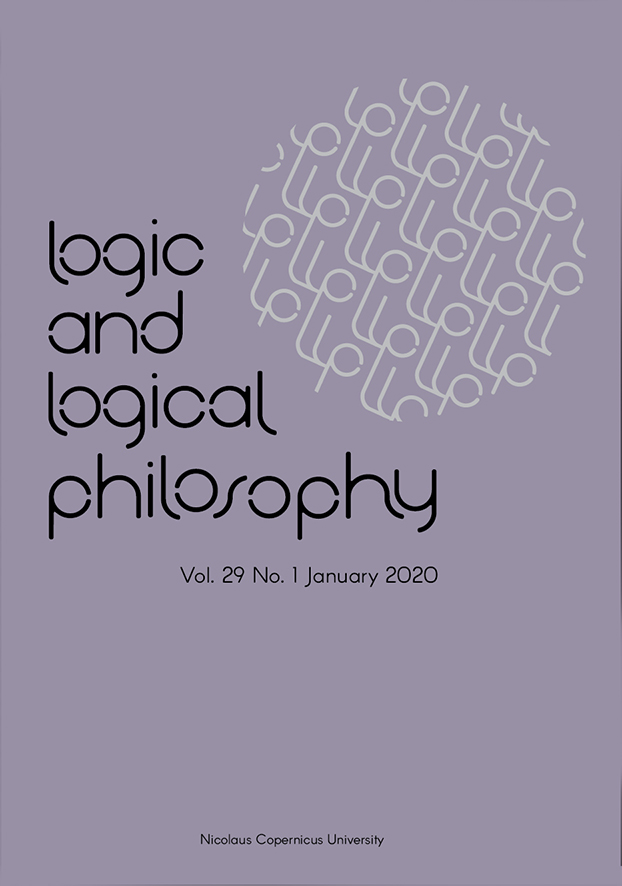Classical Logic and the Liar
DOI:
https://doi.org/10.12775/LLP.2019.019Keywords
liar paradox, truth, nonclassical logicsAbstract
The liar and kindred paradoxes show that we can derive contradictions when we reason in accordance with classical logic from the schema (T) about truth: S is true iff p, where ‘p’ is to be replaced with a sentence and ‘S’ with a name of that sentence. The paper presents two arguments to the effect that the blame lies not with (T) but with classical logic. The arguments derive contradictions using classical logic, but instead of appealing to (T), they invoke semantic claims that seem even harder to reject. The first argument relies on two standard semantic principles that are not disquotational and on the claim that if there is such a thing as the property of being true, then ‘true’ expresses that property. The second argument relies on a schema about meaning: S means that p, where ‘S’ and ‘p’ are to be replaced as before.
References
Barcan, M.R., “Quantification and ontology”, pages 75–87 in her Modalities: Philosophical Essays, New York: Oxford University Press, 1993 (reprinted with changes from Noûs 6, 3 (1972): 240–250).
Barwise, J., and J. Etchemendy, The Liar: An Essay on Truth and Circularity, New York: Oxford University Press, 1987.
Dummett, M., The Logical Basis of Metaphysics, London: Duckworth, 1991.
Dunn, J., and N. Belnap, “The substitution interpretation of the quantifiers”, Noûs 2, 2 (1968): 177–185. DOI: http://dx.doi.org/10.2307/2214704
Field, H., Saving Truth from Paradox, Oxford: Oxford University Press, 2008. DOI: http://dx.doi.org/10.1093/acprof:oso/9780199230747.001.0001
Gaifman, H., “Pointers to truth”, The Journal of Philosophy 89, 5 (1992): 223–261. DOI: http://dx.doi.org/10.2307/2027167
Grover, D., J. Camp and N. Belnap, “A prosentential theory of truth”, Philosophical Studies 27, 2 (1975): 73–125. DOI: http://dx.doi.org/10.1007/BF01209340
Haack, S., Philosophy of Logics, Cambridge: Cambridge University Press, 1978. DOI: http://dx.doi.org/10.1017/CBO9780511812866
Horwich, P., Truth, 2nd edition, Oxford: Clarendon Press, 1998. DOI: http://dx.doi.org/10.1093/0198752237.001.0001
Kripke, S., “Is there a problem about substitutional quantification?”, pages 325–419 in G. Evans and J. McDowell (eds.), Truth and Meaning: Essays in Semantics, Oxford: Oxford University Press, 1976.
Künne, W., Conceptions of Truth, Oxford: Clarendon Press, 2003. DOI: http://dx.doi.org/10.1093/0199241317.001.0001
Pagin, P., “‘Means that’ and the liar”, pages 203–230 in H. Malmgren (ed.), Kvantifikator för en Dag: Essays Dedicated to Dag Westerståhl on His Sixtieth Birthday, Philosophical Communications, Web Series, no. 35, Sweden: Götenburg University, Department of Philosophy, 2006.
Priest, G., In Contradiction: A Study of the Transconsistent, 2nd edition, New York: Oxford University Press, 2006. DOI: http://dx.doi.org/10.1093/acprof:oso/9780199263301.001.0001
Prior, A., “Some problems of self-reference in John Buridan”, pages 130–146 in his Papers in Logic and Ethics, London: Duckworth, 1976.
Putnam, H., “The nature of mental states”, pages 429–440 in his Mind, Language and Reality: Philosophical Papers, vol. 2, Cambridge: Cambridge University Press, 1975 (first published as “Psychological predicates”, pages 37–48 in W. Capitan and D. Merrill (eds.), Art, Mind, and Religion, Pittsburgh: University of Pittsburgh Press, 1967). DOI: http://dx.doi.org/10.1017/CBO9780511625251.023
Read, S., “The truth-schema and the liar”, pages 3–17 in S. Rahman, T. Tulenheimo and E. Genot (eds.), Unity, Truth and the Liar: The Modern Relevance of Medieval Solutions to the Liar Paradox, Logic, Epistemology, and the Unity of Science, vol. 8, Springer, 2008. DOI: http://dx.doi.org/10.1007/978-1-4020-8468-3_1
Rumfitt, I., “Truth and meaning”, Aristotelian Society Supplementary Volume 88 (2014): 21–55.
Smith, N., “Semantic regularity and the liar paradox”, The Monist 89, 1 (2006): 178–202. DOI: http://dx.doi.org/10.5840/monist200689139
Soames, S., Understanding Truth, New York: Oxford University Press, 1999. DOI: http://dx.doi.org/10.1093/0195123352.001.0001
Stephanou, Y., “A propositional theory of truth”, Notre Dame Journal of Formal Logic 59, 4 (2018): 503–545. DOI: http://dx.doi.org/10.1215/00294527-2018-0013
Stern, J., Toward Predicate Approaches to Modality, Cham, Switzerland: Springer, 2016. DOI: http://dx.doi.org/10.1007/978-3-319-22557-9
Tarski, A., “The concept of truth in formalized languages”, pages 152–278 in his Logic, Semantics, Metamathematics, translated by J. H. Woodger and edited by J. Corcoran, 2nd edition, Indianapolis: Hackett, 1983.
Van Fraassen, B., “Presupposition, implication, and self-reference”, The Journal of Philosophy 65, 5 (1968): 136–152. DOI: http://dx.doi.org/10.2307/2024557
Williamson, T., “Vagueness and ignorance”, Aristotelian Society Supplementary Volume 66 (1992): 145–162. DOI: http://dx.doi.org/10.1093/aristoteliansupp/66.1.145
Williamson, T., “Indefinite extensibility”, Grazer Philosophische Studien 55 (1998): 1–24. DOI: http://dx.doi.org/10.5840/gps19985512
Williamson, T., “Truthmakers and the converse Barcan formula”, Dialectica 53, 3–4 (1999): 253–270. DOI: http://dx.doi.org/10.1111/j.1746-8361.1999.tb00186.x
Yablo, S., “New grounds for naive truth theory”, pages 312–330 in J.C. Beall (ed.), Liars and Heaps: New Essays on Paradox, Oxford: Clarendon Press, 2003.
Zardini, E., “Truth without contra(di)ction”, The Review of Symbolic Logic 4, 4 (2011): 498–535. DOI: http://dx.doi.org/10.1017/S1755020311000177
Downloads
Published
How to Cite
Issue
Section
Stats
Number of views and downloads: 1569
Number of citations: 0







